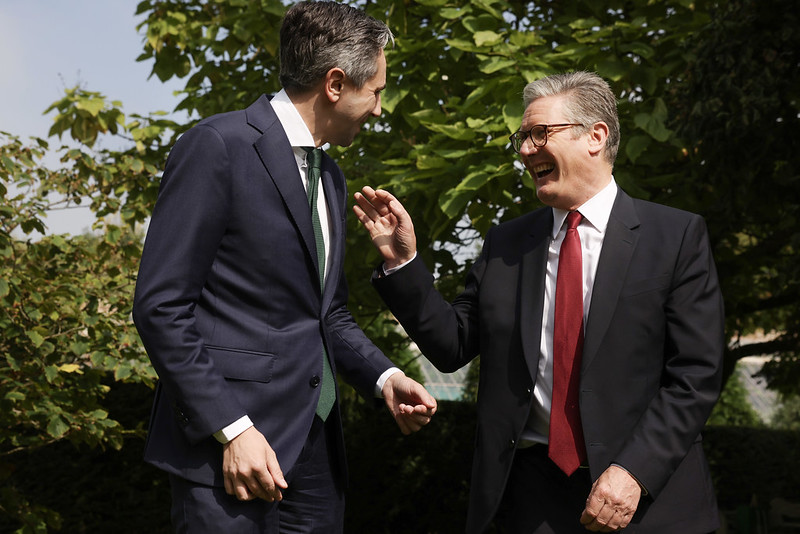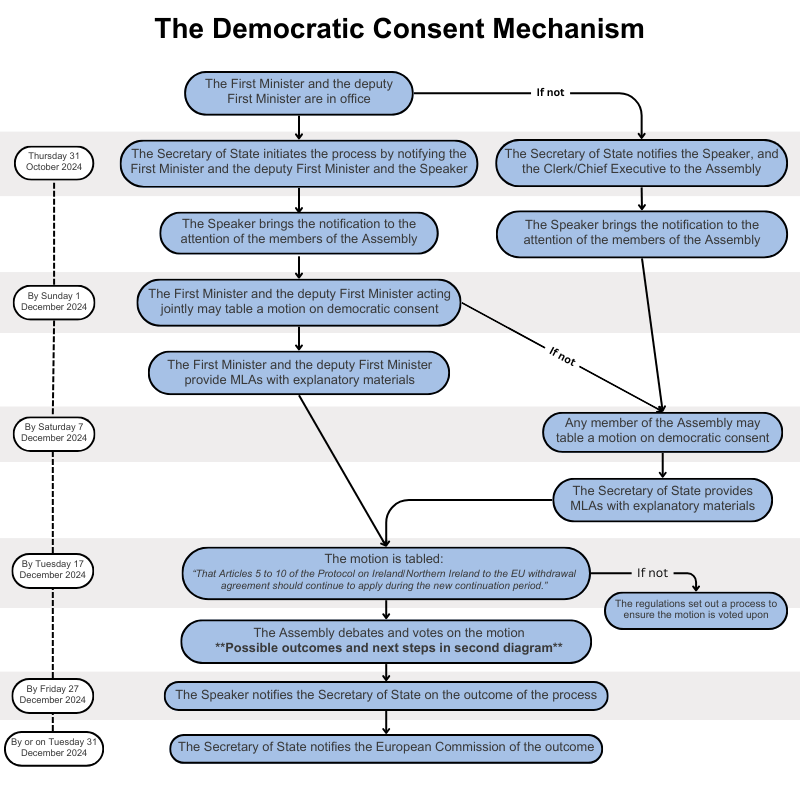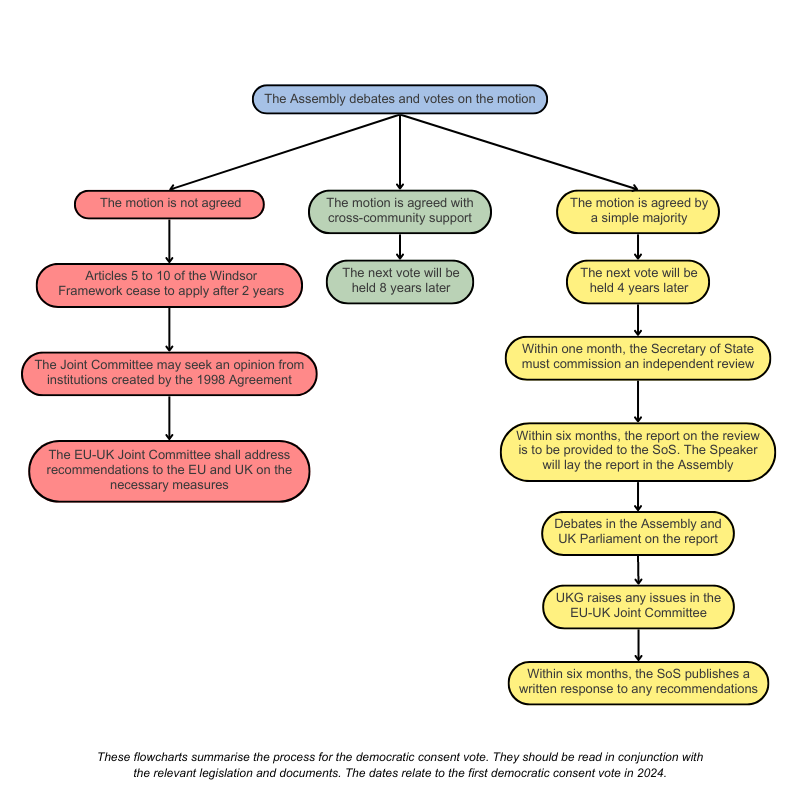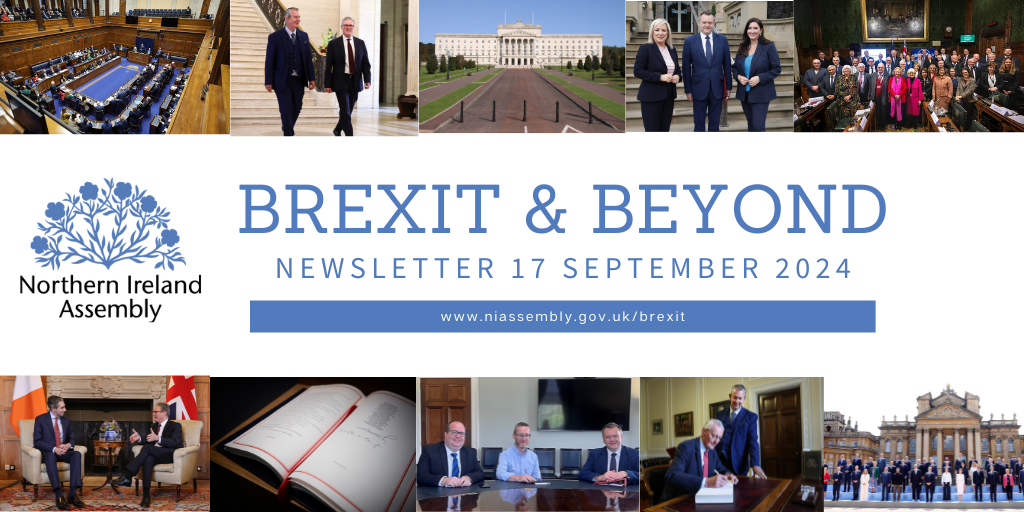Brexit & Beyond newsletter
9 September 2024
Welcome to the 9 September 2024 Brexit & Beyond newsletter
This week, the Prime Minister visited Dublin - the first British prime minister to visit Ireland for five years. On the same day, the British-Irish Association conference was held in Oxford.
Moving into Autumn, many are looking towards the democratic consent vote which must be held before the end of the year. We have put together a number of resources on how the vote process will work and what the possible outcomes could be. Writing for Pivotal public policy forum, Professor David Phinnemore of QUB considers the outcomes of the vote.
Since the European Scrutiny Committee no longer exists, there not a dedicated Commons committee examining issues around the Government’s management of the UK’s relationship with the EU. Jill Rutter and Hannah White of the Institute for Government discuss options and argue for a new committee that can look both at the UK’s implementation of existing agreements and also its overall management of the relationship.
UK relations with the Republic of Ireland
The Prime Minister visited Dublin on Saturday (7 September) where he met the Taoiseach, Simon Harris. He is the first British prime minister to visit Ireland for five years. At a press conference alongside the Taoiseach, Mr Starmer commented on changing the relationship with the Republic of Ireland: “That reset, I think, can be meaningful, it can be deep. Of course, it covers the relationship between our two countries. Obviously, it has to cover the Good Friday agreement and I take very seriously our joint role in relation to that.”
 The Taoiseach Simon Harris and Prime Minister Keir Starmer meeting at at Farmleigh House, Dublin on Saturday 7 September
The Taoiseach Simon Harris and Prime Minister Keir Starmer meeting at at Farmleigh House, Dublin on Saturday 7 September
Downing Street said the visit marked a "new era of co-operation and friendship" between Britain and Ireland. In a statement published ahead of the visit, the Prime Minister also said. “Our relationship has never reached its full potential, but I want to change that. We have a clear opportunity to go further and faster to make sure our partnership is fully delivering on behalf of the British and Irish people – driving growth and prosperity in both our countries.
While the Tánaiste said the EU wanted an improved EU-UK relationship he cautioned the UK could not “cherrypick” any particular issues. Micheál Martin said the Republic of Ireland was in favour of a veterinary deal to ease paperwork and checks on its huge exports of cheese, butter and other farm produce to Britain. But he added that the UK could not just present a list of demands to the EU.
The Northern Ireland secretary, Hilary Benn, told the British-Irish Association conference in Oxford on Saturday that Labour was committed to implementing the Brexit deal in full in Northern Ireland in order to get a veterinary deal with the EU to reduce or potentially remove barriers to exports and imports of farm products.
“We will implement the Windsor framework [the Northern Ireland trading arrangements] with pragmatic good faith, not least because we need to do so in order to be able to negotiate a veterinary agreement with the European Union, but also in order to protect the open border on the island of Ireland.”
The Protocol/Windsor Framework and the 2024 Democratic Consent Vote
As many of you will know, Article 18 of the Windsor Framework contains ‘the democratic consent mechanism’. This is a vote by the Northern Ireland Assembly on the continued application of Articles 5 to 10 of the Windsor Framework – the parts of the Framework under which Northern Ireland applies regulations relating to the EU single market – which must be held before the end of 2024.
We have compiled further information about the democratic consent mechanism that you can find is available on the Assembly’s webpages including a handy flowchart and downloadable explainer.

If you experience any issues with the flowchart, you can read this text version.
The outcome of the vote will determine the next steps and we have summarised these below.

If you experience any issues with the flowchart, you can read this text version.
Professor David Phinnemore of Queen’s University Belfast, writing for Pivotal public policy forum, considers the outcomes of the vote, concluding that the vote later this year will not be without consequence. Without agreement, he suggests, “the terms of the UK–EU Trade and Cooperation Agreement will apply at the land border. The movement of goods into Northern Ireland from the rest of the UK would revert essentially to how they were pre–Brexit but the movement of goods between Newry and Dundalk would be subject to the same formalities, checks and controls as between Dover and Calais.”
Professor Phinnemore has also published an explainer with Dr Lisa Claire Whitten of Queen’s University on the Protocol/Windsor Framework and the 2024 Democratic Consent Vote.
Parliamentary scrutiny of EU relations
Since the European Scrutiny Committee (ESC) has been abolished, there is no longer a dedicated House of Commons committee examining issues around the Government’s management of the UK’s relationship with the EU. While the House of Lords has re-established its European Affairs Committee, it remains to be seen whether that committee’s Sub-Committee on the Windsor Framework will be established again.
They suggest the best option would be for the government to revisit its decision not to replace the ESC and establish an EU Relations Committee, with an elected Chair.
Alternatively, if the government chooses not to reconsider, Rutter and White submit that the House of Commons Public Administration and Constitutional Affairs Committee (PACAC) should consider setting up its own subcommittee to focus on EU relationship management. Furthermore, they recommend the Liaison Committee (the Committee that is made up of Committee Chairs and considers the overall work of select committees and questions the Prime Minister about policy) should ensure that it regularly schedules sessions with the Prime Minister to examine progress towards his priority of resetting the relationship.
With the new government’s efforts towards trade deals, Rutter and White argue the government, as part of its promised trade strategy, should also set out an expanded role for parliament in scrutinising trade agreements. They suggest the Trade and Business Committee could establish a trade sub-committee.
Touring Artists
The music industry has pressed the UK government to solve post-Brexit limits on touring. A 2023 survey by the Independent Society of Musicians (ISM) showed that, since Brexit, almost half of UK musicians and music industry workers have had less work in the EU, and more than a quarter had none at all. Tom Kiehl, chief executive of the umbrella body UK Music, said: “The UK’s exit from the EU has created significant barriers that have made live music touring more expensive, bureaucratic and confusing for musicians, artists and crew”.
The issues faced by touring artists have been discussed at the Parliamentary Partnership Assembly (PPA), the forum for Members of the UK and European Parliaments to discuss matters of common interest. The PPA last year made a number of recommendations to the Partnership Council (the UK-EU governance body which oversees the Trade & Cooperation Agreement) to tackle the issues
- Urges the Partnership Council to prioritise the mobility of touring artists, with a view to developing a comprehensive approach that would allow artists and their teams to tour freely in the EU and UK - potentially as part of the forthcoming Trade and Cooperation Agreement Review – whilst recognising that this would form part of a broader political discussion encompassing a wide range of other issues;
- Calls on the Partnership Council to work towards an agreement on streamlining visa, customs and work arrangements for touring artists and their teams; and
- Calls for a redoubling of the efforts between the UK Government and the EU Member States to tackle artists’ concerns referred to above; for EU Schengen Member States to expand their offer for visa and work permit-free visits for touring artists and their teams up to the Schengen limit of 90 days in a period of 180, and to provide clear and comprehensive guidance online for touring artists and staff; and for the UK to reciprocate these efforts to reduce barriers to EU touring artists and to make clear information available online.
The Partnership Council’s response is here.
UK government

Conformité Européene or European Conformity marking
The UK Government introduced a new UKCA (UK Conformity Assessed) mark in January 2021 to replace EU harmonised standards. The Government has since legislated to continue recognition of current EU requirements, including the CE marking (Conformité Européene or European Conformity marking) indefinitely for a range of product types. This means businesses can use either UKCA (or CE marking to sell products in GB.
Different rules apply in Northern Ireland – for products that can use a UKCA marking in GB, these must meet EU rules in Northern Ireland, including having a CE marking.
The Minister for Building Safety and Homelessness, Rushanara Ali MP, announced on 2 September that the government would extend the period of recognition of CE (Conformité Européenne) marking for construction products. Minister Ali said Ali said, “We have listened to the findings from the Independent Review of the Construction Products Testing Regime. This was clear that there is currently insufficient testing and certification capacity in the UK alone to provide the volume of conformity assessment that would be required were CE recognition to end.”
“We are also clear that ending recognition of CE marking without reforming the domestic regime would create trade barriers and negatively affect the supply of products that meet recognised standards.”
The Minister also said, “I am making this extension, and the longer-term future of CE/UKCA marking, conditional on this government committing to a system-wide reform of the construction products regulatory regime.” Furthermore, any subsequent changes to the recognition of CE marking would be subject to a transition period of at least two years to give certainty to supply chains.
Other news
- Luke McGee reported on “Operation softer Brexit” in the i newspaper, noting that the appointment of Nick Thomas-Symonds comes with a restructuring of how Brexit policy fundamentally works. As a Minister in the Cabinet Office, he can draw on European policy expertise from across government, whereas the FCDO tends to draw on its own people.
- Michel Barnier, formerly the EU’s chief Brexit negotiator is the new Prime Minister of France. He said his first task was to “respond as best we can to the challenges, the anger, the feeling of abandonment and injustice that is too prevalent in our cities, on our estates and in the countryside”. Following his appointment, more than 100,000 people protested across France on Saturday. The protests were called by trade unions and members of the NPF, who are furious that their own candidate for prime minister was rejected by President Emmanuel Macron.
- The Home Office says a "reset in the relationship with Europe" has led to a 50% increase in the number of NCA officers based with Europol and that officers are being sent to Romania and those South East Asian countries where gangs advertise Channel crossings.
- The Guardian reports that Keir Starmer’s anticipated meeting with the president of the European Commission has been postponed amid EU disappointment at the UK government’s continuing caution about reinstating programmes such as the youth mobility and Erasmus university exchange schemes.




